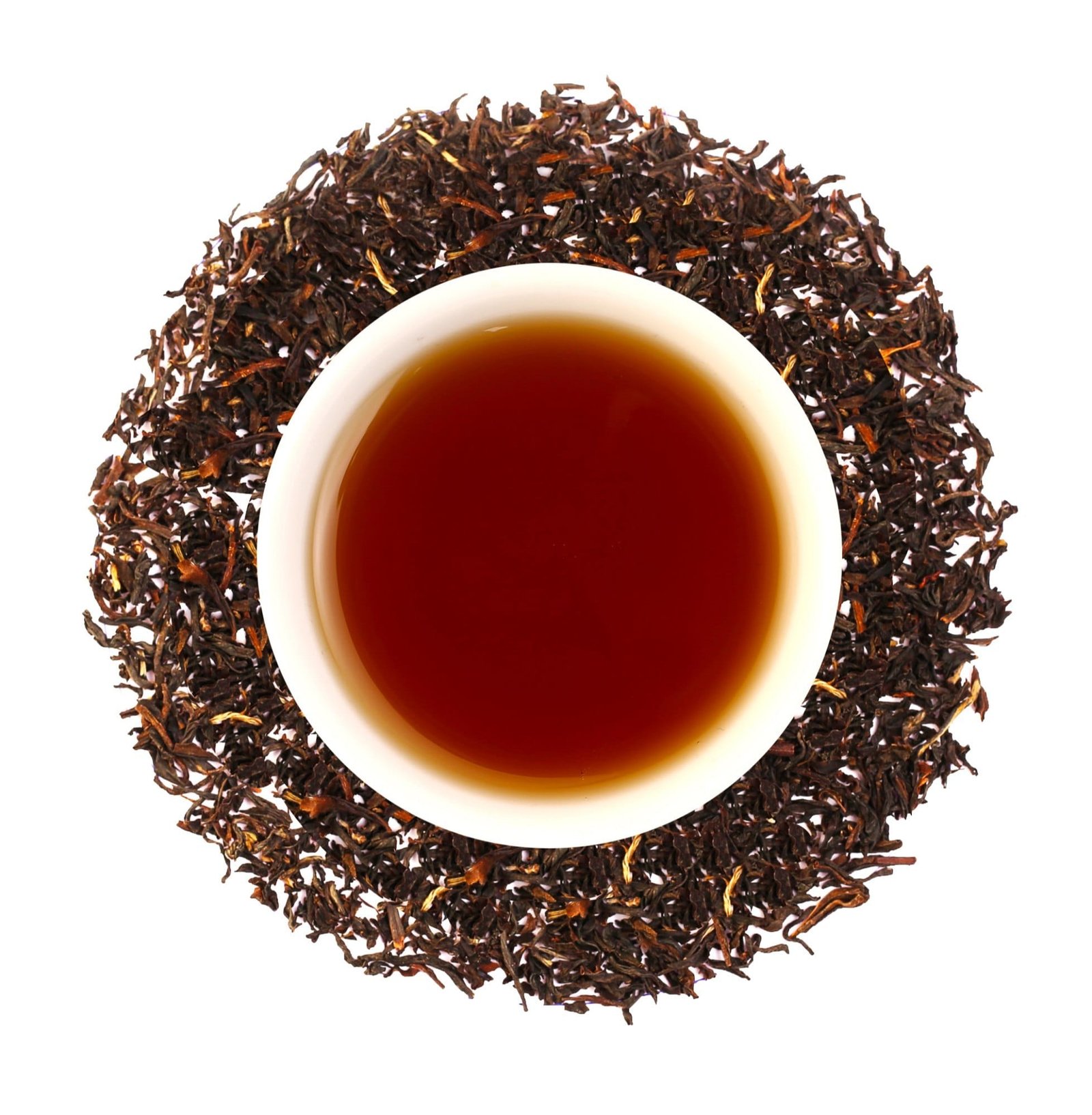
Summary of Contents
Introduction to Assam’s Bold Brew
Renowned for its strong flavor and malty richness, Assam black tea stands as a global favorite among tea connoisseurs. Assam black tea, often processed as Assam Orthodox tea, originates in the fertile, rain-soaked plains of the Brahmaputra Valley in Assam, Northeast India. With a unique combination of health benefits, cultural importance, and economic influence, Assam black tea is more than just a flavorful beverage—it’s a cherished legacy of the region.
Natural Habitat and Varieties
Assam, nestled in the northeastern part of India, is renowned for its lush landscapes and rich agricultural heritage. The region’s low-altitude, humid climate, coupled with the fertile soil nourished by the Brahmaputra River, provides the ideal conditions for cultivating high-quality tea.
- Camellia sinensis var. assamica: The tea plant grown in Assam, Camellia sinensis var. assamica, is a unique variety known for its large leaves, resilience, and ability to thrive in the tropical conditions of Northeast India.
- Adaptability: This variety has adapted over centuries to the region’s specific climatic and soil conditions, producing tea with distinct characteristics.
Varieties of Assam Tea
CTC (Crush, Tear, Curl) Tea: This variety is processed using a machine that crushes, tears, and curls the tea leaves into small pellets. CTC tea is known for its robust, brisk flavor and is particularly popular for making masala chai, a spiced Indian tea. The CTC process is more efficient and produces a higher yield than the traditional Orthodox method, making it a more affordable option.
Assam Orthodox Tea: Produced using traditional methods, Assam Orthodox tea preserves the rich flavors and aromatic qualities of the tea leaf. The leaves are plucked by hand, withered, rolled, fermented, and fired in a process that emphasizes quality and craftsmanship. This results in a delicate and refined tea with a malty, fruity flavor and a vibrant amber color.
History and Tradition of Assam Black Tea
The story of Assam tea begins in the early 19th century when British explorers stumbled upon wild tea plants growing in the lush jungles of Assam. Intrigued by their discovery, they sent samples back to England for analysis. The British East India Company, recognizing the potential of this new tea source, established tea plantations in Assam in the 1830s.
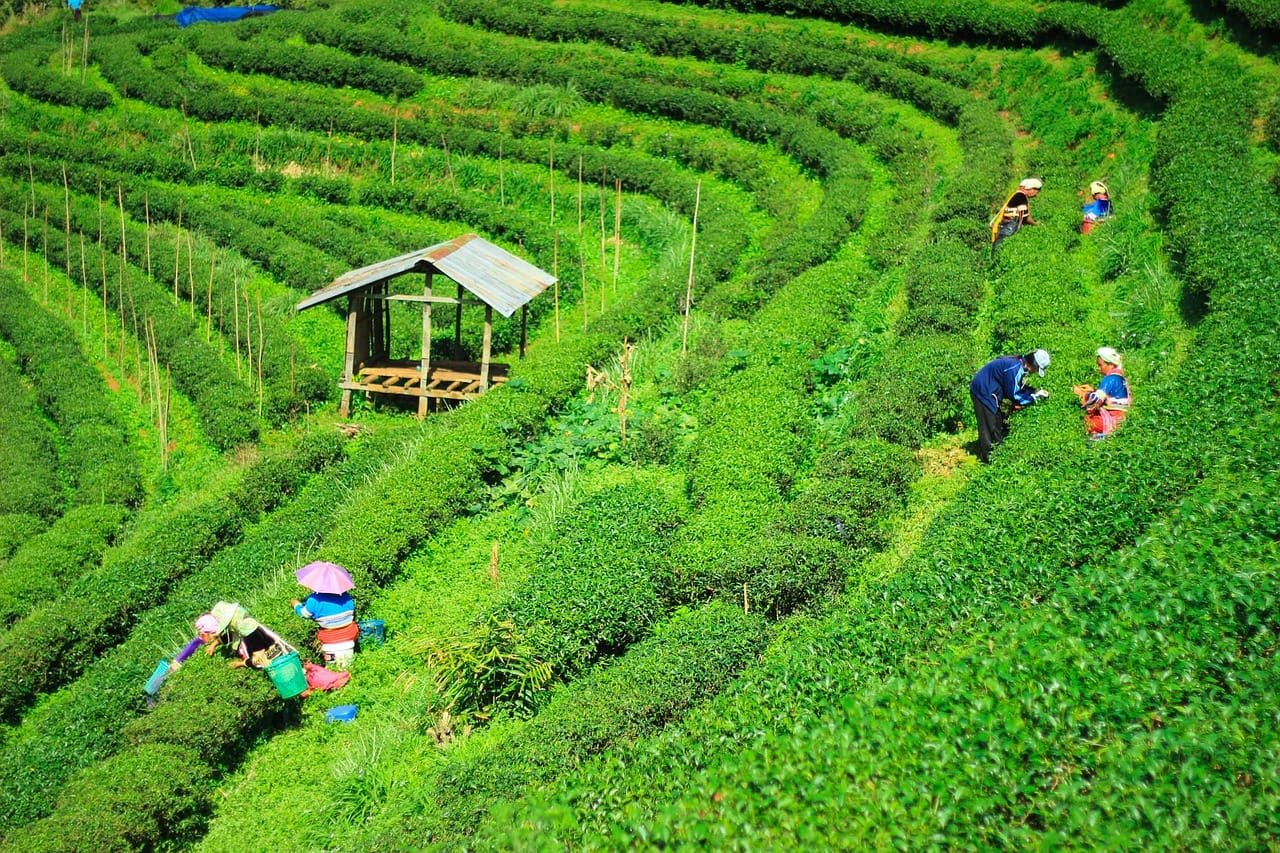
British Influence
- Colonial Expansion: The British East India Company played a pivotal role in introducing and developing tea cultivation in Assam. The company’s colonial ambitions and economic interests led to the establishment of vast tea plantations in the region.
- Scientific Cultivation: The British brought their expertise in tea cultivation, including knowledge of plant propagation, processing techniques, and quality control. They introduced modern agricultural practices, such as the use of clonal tea plants, to improve yields and ensure consistent quality.
Cultural Significance
- Social Symbol: In Assam, tea is more than just a beverage; it’s a social and cultural symbol. Every household begins the day with a fresh cup of Assam tea, and it is an integral part of social gatherings and hospitality.
- Shared Experiences: Drinking tea together fosters a sense of community and shared experiences. It is a common practice for friends and family to gather over cups of tea, engaging in conversation and strengthening bonds.
- Cultural Identity: Assam tea has become an integral part of Assam’s cultural identity. It is often associated with the region’s natural beauty, rich heritage, and warm hospitality.
Tea as a Symbol of Unity
- Regional Pride: Assam tea has united people from diverse backgrounds, transcending social and economic divisions. It has become a source of regional pride and a symbol of Assam’s contribution to the global tea industry.
- Shared Heritage: The shared love for tea has fostered a sense of camaraderie and belonging among the people of Assam. It is a common thread that connects people from different walks of life, regardless of their age, gender, or socioeconomic status.
From its humble beginnings as a wild plant in the Assamese jungles to its global recognition today, Assam tea has come a long way. The British East India Company’s role in introducing and developing tea cultivation in the region laid the foundation for Assam’s tea industry. Today, Assam tea is not only a beloved beverage but also a cultural symbol, reflecting the region’s rich heritage and the enduring spirit of its people.
Health Benefits of Assam Black Tea
Assam black tea, with its rich flavor and deep color, is not only a delightful beverage but also a source of various health benefits. Here are some of the key reasons why Assam black tea is so popular worldwide:
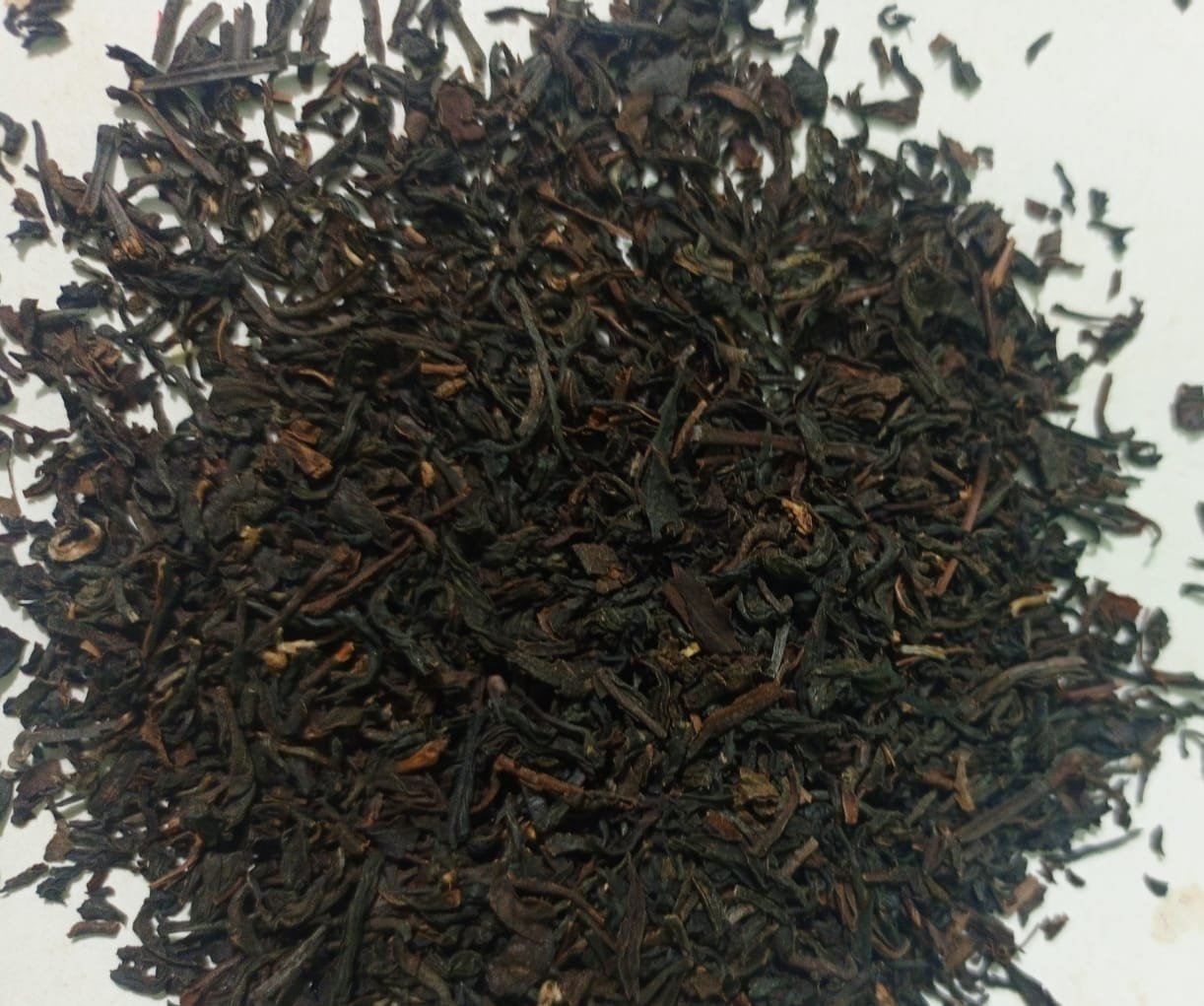
Rich in Antioxidants
Packed with powerful antioxidants like flavonoids, Assam black tea fights free radicals, helping to reduce the risk of chronic diseases and improve overall health.
- Fighting Free Radicals: Assam black tea is packed with powerful antioxidants, particularly flavonoids, which help neutralize harmful free radicals in the body.
- Preventing Chronic Diseases: By reducing oxidative stress, antioxidants contribute to a lower risk of chronic diseases such as heart disease, cancer, and neurodegenerative disorders.
- Improved Skin Health: Antioxidants also play a crucial role in maintaining healthy skin, reducing the appearance of wrinkles and protecting against premature aging.
Boosts Digestive Health
The tea’s anti-inflammatory properties aid in digestion and help prevent issues like bloating and indigestion. Drinking Assam tea after meals is a common practice in Assam to support digestion.
- Anti-inflammatory Properties: Assam black tea contains compounds with anti-inflammatory properties, which can help soothe the digestive tract and reduce inflammation.
- Aiding Digestion: Drinking Assam tea after meals can aid digestion by stimulating the production of digestive enzymes and promoting healthy gut function.
- Preventing Bloating: The anti-inflammatory effects of Assam tea can also help alleviate bloating and discomfort associated with digestive issues.
Supports Heart Health
The antioxidants in Assam black tea contribute to improved heart health by helping to lower cholesterol and support healthy blood circulation. Drinking Assam tea regularly can be beneficial for cardiovascular well-being.
- Lowering Cholesterol: The antioxidants in Assam black tea have been shown to help lower cholesterol levels, a key risk factor for heart disease.
- Improving Blood Circulation: Assam tea can also help improve blood circulation, reducing the risk of blood clots and promoting healthy blood flow to the heart and other organs.
- Reducing Blood Pressure: Some studies suggest that regular consumption of Assam black tea may help lower blood pressure, further reducing the risk of heart disease and stroke.
Enhances Focus and Mental Alertness
Thanks to its caffeine content, Assam black tea offers a natural energy boost, enhancing mental alertness and focus without the jitters often associated with coffee.
- Natural Energy Boost: The caffeine content in Assam black tea provides a natural energy boost, helping to improve concentration and mental alertness.
- Enhanced Focus: Drinking Assam tea can help increase productivity and enhance focus, making it a popular choice for students and professionals.
- Reduced Fatigue: The caffeine in Assam tea can also help combat fatigue and improve overall energy levels.
Aids in Weight Management
The catechins in Assam black tea can stimulate metabolism, aiding in weight management and making it a favorite among fitness enthusiasts seeking natural, healthy drinks.
- Stimulating Metabolism: The catechins in Assam black tea can stimulate metabolism, helping to burn calories and promote weight loss.
- Natural Appetite Suppressant: Assam tea may also have a mild appetite suppressant effect, which can help control calorie intake and support weight management efforts.
Ideal Growing Conditions for Assam Black Tea
Assam black tea, renowned for its rich flavor and robust character, thrives in the tropical climate of Northeast India. The region’s unique combination of climate, soil, and topography provides the ideal conditions for cultivating this iconic tea.
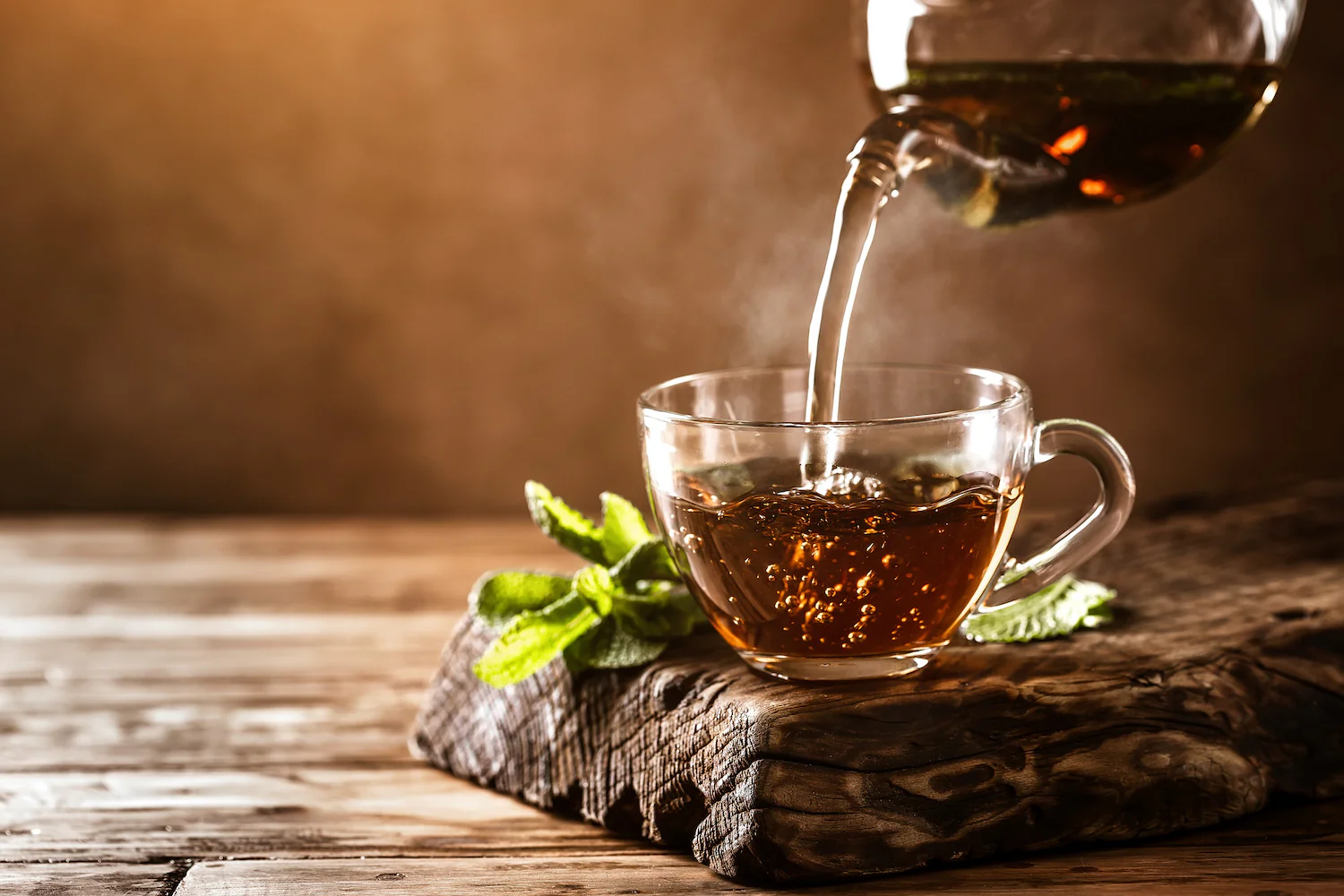
- Tropical Climate: Assam’s tropical climate, characterized by high temperatures, humidity, and abundant rainfall, is perfectly suited for tea cultivation.
- Rainfall: The region receives an average of over 2,500 mm of annual rainfall, providing ample moisture for tea plants throughout the year.
- Consistent Temperatures: The relatively consistent temperatures in Assam, with minimal fluctuations, create a stable environment for tea plant growth.
- Alluvial Soil: The fertile alluvial soils of the Brahmaputra Valley, formed by the river’s deposits, provide a rich nutrient-rich medium for tea cultivation.
- Soil Drainage: The soil in Assam is well-drained, preventing waterlogging and ensuring proper root development.
- Organic Matter: The presence of organic matter in the soil helps retain moisture, improve soil structure, and provide essential nutrients for tea plants.
- Low-Altitude Cultivation: Assam tea is primarily cultivated at lower altitudes, typically below 1,500 meters. This allows for a longer growing season and higher yields.
- Temperature Variations: The lower altitudes provide a relatively stable temperature range, which is beneficial for tea plant growth and development.
- Partial Shade: While Assam tea can tolerate some sunlight, it prefers partial shade. The shade provided by trees or other vegetation helps regulate temperature and moisture levels, protecting the tea plants from excessive heat and dryness.
- Lower Altitudes: Assam tea is typically grown at lower altitudes compared to Darjeeling or Nilgiri tea. This results in a bolder, more robust flavor profile.
Best Organic Farming Practices for Assam Tea
To ensure the long-term sustainability of tea production in Assam, many tea estates have adopted organic farming practices. These methods focus on minimizing the use of synthetic chemicals while promoting soil health, biodiversity, and fair labor practices.
Organic Mulching
- Moisture Retention: Mulching helps retain soil moisture, reducing water loss and preventing erosion.
- Nutrient Enrichment: Organic materials in mulch decompose, adding nutrients to the soil and improving its fertility.
- Weed Suppression: Mulch acts as a physical barrier, hindering weed growth and reducing competition for resources.
Natural Pest Control
- Biological Control: Using natural predators and beneficial insects to control pests, disrupting their life cycles and reducing their populations.
- Neem-Based Products: Neem oil and neem extracts are effective natural insecticides that can deter pests without harming beneficial organisms.
- Cultural Practices: Employing crop rotation, intercropping, and proper sanitation to create an unfavorable environment for pests.
Crop Rotation
- Breaking Pest Cycles: Rotating crops can disrupt the life cycles of pests, making it difficult for them to establish populations.
- Improving Soil Health: Different crops have varying nutrient requirements, and crop rotation can help balance soil nutrients and prevent nutrient depletion.
- Reducing Reliance on Chemicals: By diversifying crops, farmers can reduce their dependence on chemical inputs for pest and disease control.
Water Conservation
- Efficient Irrigation: Implementing drip irrigation or sprinkler systems can help deliver water directly to the root zone, reducing water waste.
- Rainwater Harvesting: Collecting rainwater and storing it for irrigation can help supplement water resources during dry periods.
- Water-Holding Capacity: Improving soil structure through organic practices can enhance its water-holding capacity, reducing the need for frequent irrigation.
By adopting these sustainable practices, Assam tea producers can contribute to a healthier environment, produce high-quality organic tea, and support the livelihoods of local communities.
Economic Impact of Assam Black Tea
Assam tea is a cornerstone of the region’s economy, providing livelihoods for millions and contributing significantly to India’s tea exports. Here’s a closer look at its economic impact:
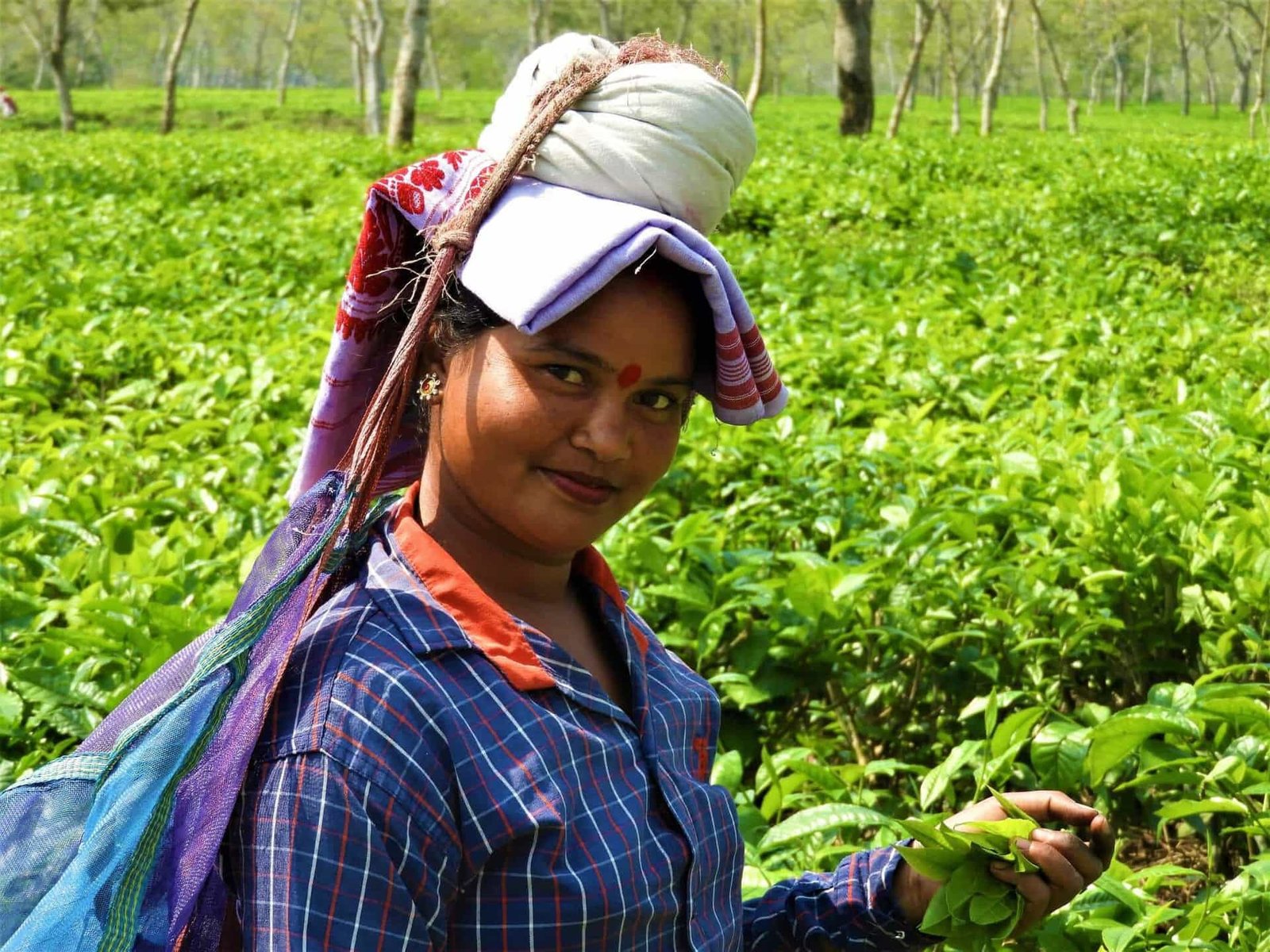
Profitability of Tea Farming
- High Returns: Tea farming in Assam can be highly profitable, with a well-managed 1-acre tea plantation capable of generating an annual income of ₹100,000 to ₹200,000 or more.
- Factors Affecting Profitability: The profitability of tea farming can vary depending on factors such as the quality of tea produced, market prices, and production costs.
Employment Opportunities
- Large Workforce: The tea industry in Assam provides employment to over 1 million people, making it one of the region’s largest employers.
- Rural Livelihoods: Tea cultivation and processing support the livelihoods of countless families, particularly in rural areas.
- Job Creation: The tea industry creates jobs at various levels, from tea pluckers and factory workers to managers and exporters.
Global Demand and Export Market
- Major Export: Assam black tea is a major export product for India, accounting for a significant portion of the country’s tea exports.
- Key Markets: The United Kingdom, the Middle East, and North America are among the primary markets for Assam tea.
- Economic Benefits: Tea exports contribute billions of rupees to India’s economy, generating foreign exchange and supporting related industries.
Supporting Local Communities
- Infrastructure Development: The tea industry has played a crucial role in the development of infrastructure in tea-growing regions, including roads, schools, and healthcare facilities.
- Community Development: Tea estates often undertake social responsibility initiatives to support local communities, such as providing education, healthcare, and housing facilities.
Challenges in Growing Assam Black Tea
While Assam tea offers lucrative opportunities, farmers in the region face several challenges that can impact their livelihoods and the sustainability of the industry.
Pest and Disease Management
- Tea Mosquito Bug and Red Spider Mites: These pests can cause significant damage to tea plants, reducing yield and quality.
- Organic Farming Challenges: Organic farmers may face difficulties in managing pests effectively without the use of chemical pesticides, which can be challenging in the humid conditions of Assam.
- Integrated Pest Management (IPM): While IPM practices can help mitigate pest problems, they require careful monitoring and timely intervention.
Climate Change and Yield Variability
- Unpredictable Rainfall: Changes in climate patterns, including unpredictable rainfall and temperature fluctuations, can disrupt the delicate balance required for optimal tea plant growth.
- Yield Reduction: Climate change can lead to reduced yields and lower quality tea due to factors such as heat stress, drought, and changes in soil moisture.
- Adapting to Climate Change: Farmers need to develop strategies to adapt to changing climate conditions, such as selecting climate-resilient tea varieties and implementing sustainable water management practices.
Market Price Fluctuations
- Global Demand: The global tea market is influenced by various factors, including consumer preferences, economic conditions, and geopolitical events.
- Supply and Demand: Fluctuations in supply and demand can lead to price volatility, affecting the income of tea farmers.
- Risk Management: Farmers need to develop strategies to manage market risks, such as diversifying their income sources and participating in price hedging mechanisms.
Everyday Enjoyment of Assam Black Tea
Assam black tea, with its robust flavor and rich aroma, has found a place in the hearts of tea lovers worldwide. Its versatility allows for a variety of brewing methods and applications, making it a staple in many households.

Traditional Masala Chai
- A Beloved Blend: Masala chai, a spiced tea made with Assam black tea, milk, sugar, and aromatic spices like cardamom, ginger, and cloves, is a beloved beverage in India.
- Warmth and Comfort: The combination of Assam tea’s strong flavor with the sweetness of milk and the warmth of spices creates a comforting and energizing drink.
- Social Ritual: Enjoying masala chai together is a common social ritual in India, fostering a sense of community and shared experiences.
Iced Assam Black Tea
- Refreshing Twist: Assam black tea’s bold flavor makes it an excellent choice for iced tea, especially in hot climates.
- Flavor Variations: Pairing iced Assam tea with lemon, fruit syrups, or mint can create refreshing and flavorful variations.
Value-Added Products
- Assam Black Tea Powder: Ground Assam black tea powder can be used in baking and cooking to add a unique flavor profile to dishes. It is also used in cosmetic products due to its antioxidant properties.
- Assam Black Tea Essential Oil: Extracted from tea leaves, Assam black tea essential oil is prized for its soothing and calming aroma. It is used in aromatherapy, skincare products, and as a natural fragrance.
- Assam Black Tea Extracts and Capsules: For those seeking the health benefits of Assam black tea in a convenient form, extracts and capsules are available. These concentrated forms can be consumed as dietary supplements or added to beverages and foods.
Conclusion
Assam black tea is more than a drink; it’s a symbol of cultural pride, a source of livelihood, and a health-boosting beverage enjoyed worldwide. With its bold flavors, numerous health benefits, and rich history, Assam black tea continues to be a global favorite. By choosing Assam tea, consumers support sustainable agriculture and the hardworking farmers of Northeast India.
If you’re curious to learn more about the incredible crops of Northeast India, explore our Top 20 Crops in Northeast India for more insights into the region’s agricultural diversity and heritage.
FAQ Section
Q: What is the income of a 1-acre tea plantation?
A: Income from a 1-acre tea plantation varies depending on yield, quality, and market prices, but it can be a profitable venture, especially when exporting high-quality Assam Orthodox tea.
Q: Is tea farming profitable?
A: Yes, tea farming is profitable, especially in Assam where high demand for black tea brings in stable income. Profitability can increase with sustainable practices and organic certification.
Q: How is tea cultivated in Assam?
A: Tea is cultivated in Assam in tropical, humid conditions using techniques like organic mulching, IPM for pest control, and shade management to produce quality black tea.
Q: What are the methods of cultivation of tea?
A: Tea is cultivated through organic mulching, pest control, pruning, and regular plucking cycles to ensure healthy growth and high yield.
Q: What is the lifespan of a tea plant?
A: Tea plants can live and produce for 40-50 years or more with proper care, though their productivity often peaks around 20-30 years.
Q: Which fertilizer is used in tea plantation?
A: Organic compost and natural fertilizers, like neem-based products, are commonly used in Assam tea plantations to improve soil health and maintain organic certification.
Q: Which tea is better, Assam or Darjeeling?
A: Assam tea is known for its strong, malty flavor, while Darjeeling tea offers a lighter, floral taste. Both are unique and cater to different flavor preferences.
